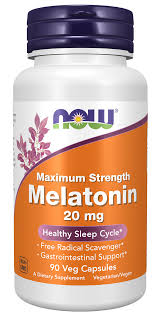The Benefits of 20 mg Melatonin: What You Need to Know
Melatonin is a hormone naturally produced by the pineal gland in the brain that helps regulate sleep-wake cycles. It plays a crucial role in signaling to the body when it’s time to sleep and wake up. While melatonin supplements are commonly used to address sleep issues, the optimal dosage can vary depending on individual needs and circumstances.
One common dosage available in the market is 20 mg melatonin. This higher dose is typically recommended for individuals who have difficulty falling asleep or staying asleep through the night. It can be particularly beneficial for those with severe insomnia or circadian rhythm disorders.
Here are some key benefits of using 20 mg melatonin:
- Improved Sleep Quality: Higher doses of melatonin can help improve the quality and duration of sleep, leading to a more restful night’s rest.
- Regulated Sleep Patterns: By taking 20 mg melatonin at a consistent time each day, you can help regulate your sleep-wake cycle and establish healthier bedtime routines.
- Reduced Jet Lag Symptoms: When traveling across time zones, melatonin supplements can aid in adjusting your internal clock and reducing jet lag symptoms.
- Natural Antioxidant Properties: Melatonin also acts as a potent antioxidant, helping protect cells from damage caused by free radicals and oxidative stress.
It’s important to note that while 20 mg melatonin may be beneficial for some individuals, it’s essential to consult with a healthcare provider before starting any new supplement regimen. They can provide personalized guidance based on your specific needs and health conditions.
In conclusion, 20 mg melatonin can be a valuable tool for improving sleep quality, regulating sleep patterns, and supporting overall well-being. By understanding its benefits and consulting with a healthcare professional, you can make informed decisions about incorporating melatonin supplements into your daily routine.
5 Essential Tips for Using 20 mg Melatonin Safely and Effectively
- Consult with a healthcare provider before starting melatonin supplements.
- Start with a low dose like 20 mg and adjust as needed.
- Take melatonin about 30 minutes before bedtime for best results.
- Avoid taking melatonin with alcohol or caffeine.
- Use melatonin for short-term insomnia relief rather than long-term use.
Consult with a healthcare provider before starting melatonin supplements.
It is crucial to prioritize your health and well-being by consulting with a healthcare provider before incorporating 20 mg melatonin supplements into your routine. A healthcare professional can offer personalized advice based on your individual health status, existing medications, and specific sleep concerns. By seeking guidance from a qualified expert, you can ensure that melatonin supplementation is safe and appropriate for your needs, potentially maximizing its benefits while minimizing any potential risks or adverse effects. Remember, your healthcare provider’s expertise can help you make informed decisions regarding the use of melatonin to support better sleep and overall wellness.
Start with a low dose like 20 mg and adjust as needed.
When considering using melatonin supplements, it is advisable to start with a low dose, such as 20 mg, and adjust the dosage as needed. Beginning with a lower amount allows individuals to assess their response to the supplement and make gradual adjustments based on their sleep patterns and overall well-being. It is important to monitor how the body reacts to melatonin and consult with a healthcare provider if necessary to determine the most effective dosage for achieving optimal sleep benefits.
Take melatonin about 30 minutes before bedtime for best results.
For optimal results when using 20 mg melatonin, it is recommended to take the supplement approximately 30 minutes before bedtime. This timing allows the melatonin to be absorbed efficiently and aligns with the body’s natural sleep-wake cycle, signaling to the brain that it’s time to prepare for rest. By following this guideline, individuals may experience improved sleep quality and better overall sleep patterns, helping them achieve a more restful and rejuvenating night’s sleep.
Avoid taking melatonin with alcohol or caffeine.
It is important to avoid taking 20 mg melatonin with alcohol or caffeine. Alcohol can interfere with the effectiveness of melatonin and disrupt the quality of sleep, leading to a less restful night. Caffeine, on the other hand, is a stimulant that can counteract the calming effects of melatonin, making it harder to fall asleep. By steering clear of alcohol and caffeine when taking melatonin, you can maximize its benefits and support a more consistent and healthy sleep routine.
Use melatonin for short-term insomnia relief rather than long-term use.
When considering the use of 20 mg melatonin, it is advisable to utilize it for short-term insomnia relief rather than relying on it for long-term use. Melatonin supplements can be effective in helping individuals overcome temporary sleep difficulties or adjust their sleep-wake cycle. However, prolonged and continuous use of high-dose melatonin may disrupt the body’s natural production of the hormone and lead to dependency. It is recommended to consult with a healthcare provider to determine the appropriate duration and dosage of melatonin for your specific sleep needs, ensuring that its benefits are maximized while minimizing potential risks associated with long-term usage.

